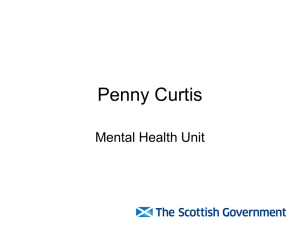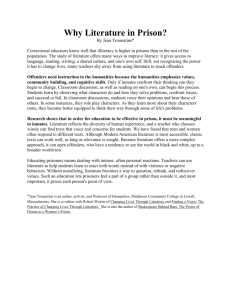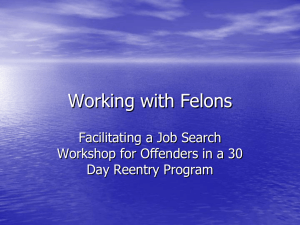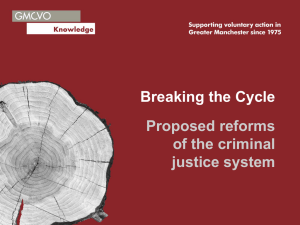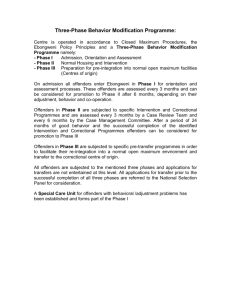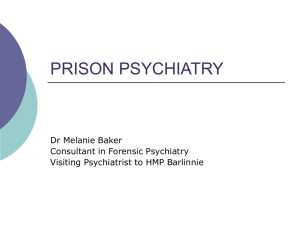Influences on Offending
advertisement
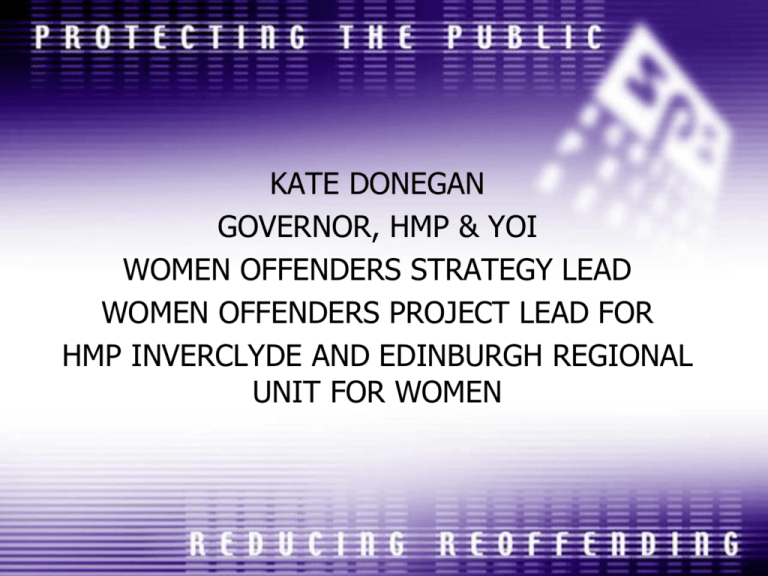
KATE DONEGAN GOVERNOR, HMP & YOI WOMEN OFFENDERS STRATEGY LEAD WOMEN OFFENDERS PROJECT LEAD FOR HMP INVERCLYDE AND EDINBURGH REGIONAL UNIT FOR WOMEN BACKGROUND • The Corston Report Home Office 2007 • Female Offenders in the Criminal Justice System Equal Opportunities Committee – Scottish Government 2009 • Cornton Vale Inspection Reports HM Chief Inspector of Prisons 2009 & 2011 • Rules for the Treatment of Women prisoners and noncustodial Measures for Women Offenders – “The Bangkok Rules” United Nations 2010 • Women in Custody – a Consultation SPS 2012 • Commission on Women Offenders Dame Eilish Angiolini 2012 THE FEMALE POPULATION IS CHARACTERISED BY; • Poor mental health - including anxiety, depression, personality disorder, learning disability, PTSD, trauma, psychopathy, autism and Aspergers • Addictions - drugs and prescription medication and alcohol • Abuse - physical, sexual, emotional childhood neglect, victimisation and sex working THE FEMALE POPULATION IS CHARACTERISED BY; • Dysfunctional family backgrounds - • Poor employment and educational attainment - Early attachment deficits, single parenthood, economic and social deprivation, the impact of mental health and addictions problems Truancy, low paid/casual work, few or no qualifications THE FEMALE POPULATION IS CHARACTERISED BY; • Single parents/primary carers - economic and social deprivation, dependant children, unstable relationships, children in care or removed permanently Generally Poor coping skills, a sense of anger about life and its challenges, poor relationships, lack of self-esteem, prevailing socio-economic conditions. COMPARED TO MALE OFFENDERS, WOMEN ARE MORE LIKELY TO; • • • • • • • Be a lower risk to public safety Be in prison for crimes of dishonesty Be placed on remand Have higher rates of mental health problems Have drug problems – including prescribed medication Have histories of physical and sexual abuse and victimisation Have dependant children NUMBERS • Women account for circa 6% of the total prison population • Currently, the breakdown is; Convicted adults Remand Convicted Young Offenders Remand Young Offenders TOTAL OVERALL TOTAL 335 90 425 16 17 33 458 SOME STATISTICS (JULY 2012) Sentence history • 48% had been on remand 1 – 5 times • 51% had served a sentence between 1 – 5 times • Only some 30% of women on remand go on to receive custodial sentences. Education • 75% left school under the age of 16 Employment • 84% were unemployed at the time of their offence SOME STATISTICS (JULY 2012) Influences on Offending • 60% said they were drunk at the time of their offence • 65% said they were under the influence of drugs • 77% always or often embarked on a course of action without thinking • 63% often or never thought about the pros and cons before breaking the law SOME STATISTICS (JULY 2012) Family Life • 69% had one or two children • 53% of the children were under 10 • 57% considered themselves to be single parents • 42% had struggled financially in the community • 40% had experienced childcare difficulties • 49% relied on social welfare SOME STATISTICS (JULY 2012) Relationships • 53% had a partner with a criminal record • 41% had committed a crime with their partner • 62% had friends involved in criminal activity • 48% thought that these connections had contributed to their offending In Care • 39% had been in care • 31% were in care at the age of 16 SOME STATISTICS (JULY 2012) Coping and Problem Solving • 53% had committed a crime to solve a problem • 54% said this was normal • 50% used alcohol to cope • 60% used drugs to escape difficulties • 53% rated their coping skills as poor or very poor SOME STATISTICS (JULY 2012) Violence • 65% had been convicted of a violent offence • 53% had used a weapon • 22% had perpetrated violence as a gang member Aggression • 78% struggled with emotions such as guilt and anxiety • 71% expressed their anger through shouting and verbal aggression • 53% actually hit out physically SOME STATISTICS (JULY 2012) Drugs • 85% used drugs at some point in their lives • 39% were still using • 73% had started to take drugs by the time they were 15 • 65% were using once or twice a day Alcohol • 47% reported drinking once or twice a day before going to prison • 70% had started to drink by the age of 15 • 72% had been drinking for more than 5 year THE ANGIOLINI REPORT REMIT • To consider the evidence on how to improve outcomes for women in the criminal justice system • To make recommendations for practical measures (in this Parliament) to reduce their reoffending • Reverse the recent increase in the female population THE ANGIOLINI REPORT • Made 37 recommendations – 6 are directly related to women in custody • HMP & YOI Cornton Vale should be replaced with a smaller specialist prison for those women serving a statutory defined long term sentence and those who present a significant risk to the public. The prison should include; • Meaningful and consistent work, sufficient premises to allow that to take place and enable all women prisoners to build skills for release and improve self esteem and mental health THE ANGIOLINI REPORT • A medical centre with adequate space for group work and individual appointments to address physical and mental health problems • A separate unit for young women • A purpose-built mother and baby unit • A family-friendly visitor centre with an outdoor play area for children • A Community Integration Unit based on the model in place at HMP Aberdeen to help women access community services and support networks prior to their release THE SPS RESPONSE: • Chief Executive, Colin McConnell as women offenders lead on the SPS Board • Consultation with 325 external stakeholders plus staff and prisoner events • Announcement of a purpose built female Establishment at Inverclyde and a regional unit for women at HMP Edinburgh – to be completed by 2016 • Appointment of a national steering group for the improvement of services to women offenders THE SPS RESPONSE: • Appointment of a Project Team to; specify the operational requirements for the prisons prepare detailed design briefs design management and performance structures for each appoint and train staff provide plans for transferring women into Inverclyde and Edinburgh provide a decommissioning and closure plan for Cornton Vale THE SPS RESPONSE: • Architects appointed • A further 2 day consultation with external stakeholders, architects and SPS staff to explore design elements and service delivery imperatives • Women’s Strategy is being subjected to a root and branch review • Research on international evidence-based best practice in the custodial care of women undertake to inform design, strategy and policy THE SPS RESPONSE: • Subject experts to be consulted on design, interventions and best practice in all fields • Project milestones are in place CORNTON VALE: PHYSICAL CHANGES • • • • • • • • • Complete refurbishment of four house blocks Creation of a family centre Refurbished gymnasium Creation of a small market garden Increase in purposeful activity Major refurbishment of the Learning Centre and library Updating of the hair salon External painting Significant refurbishment of the remand facility CORNTON VALE: PHYSICAL CHANGES • Reception redecorated • 100 women temporarily transferred to HMYOI Polmont • Video conferencing facilities expanded – set up to a standard for court hearings • Prisoners visit are upgraded, redecorated and a new children’s play area created • Visitors’ waiting area refurbished • Main entrance to be remodelled beginning early June to improve security and to provide a more suitable reception area CORNTON VALE : OTHER CHANGES • Provision of mentalisation training for staff • Staff attendance patterns under review to make best use of the staff resource • Child protection training being rolled out • Women in custody training provided to all new recruits and a modified version for existing staff • College working on an SVQ in women’s offending • Professor Kevin Power beginning a 2 year research study on trauma to include an EMDR intervention CORNTON VALE : OTHER CHANGES • Two new posts created to ensure that all potentially vulnerable women are identified, receive appropriate interventions and are linked to services in the community on release • New external placements post created • Dr Alex Quinn to lead a team which will assist staff in dealing with challenging personality disordered women and those with significant behavioural issues CORNTON VALE : OTHER CHANGES • Change Fund to finance a national mentoring scheme for women leaving prison • SPS have fully funded an Aberlour Children’s worker post for 12 months • Clinical aromatherapy and art therapy initiatives funded and in place WHAT NEXT? • Nurture what we already do well • Innovate and test new approaches leading up to 2016 • Develop and grow our links with community and criminal justice partners • Undertake a review of current routines and regime, discarding the ‘aye been’ and reinvigorating our menu of interventions and opportunities • Create gender responsive services – not modifications intended for men WHAT NEXT? • Explore interventions which will facilitate transformational change in the women in our care • Think creatively and outside the box • Focus on evidence-based practice • Research and evaluate QUESTIONS?
